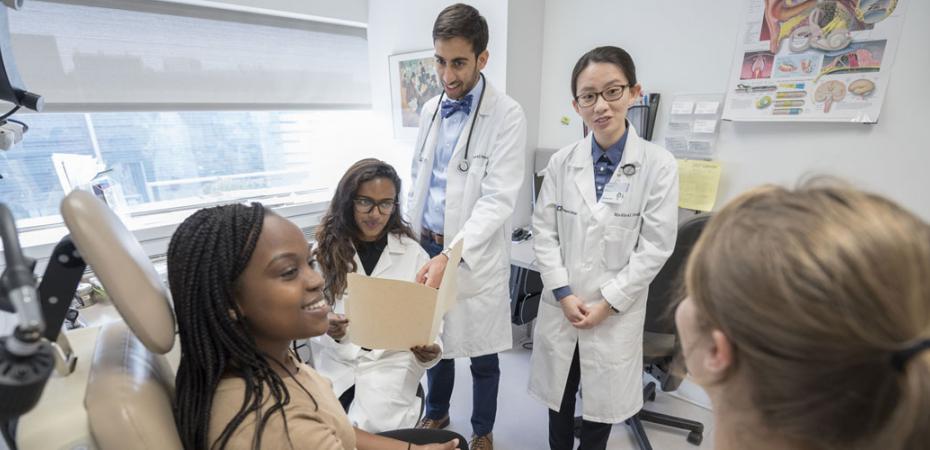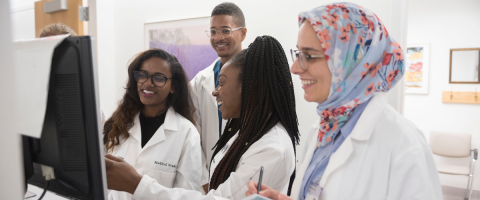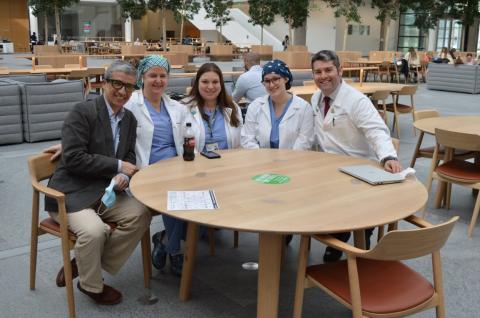
An interprofessional clinically based learning experience for advanced health professions students from multiple professions.
In Clinical Collaborative Practice (CCP) advanced health professions students from multiple professions work on interprofessional, clinically-based projects and learn clinically based teamwork skills while completing the requirements of their concurrent elective, rotation, practicum or other clinical experiences. CCP will build on the students’ interprofessional teamwork experience in Collaborative Practice I, our interprofessional service learning course for first-year health professions and social work students. The Clinical Collaborative Practice experience begins in the 2021-2022 academic year with at least five clinical sites.
Advanced students from at least two different professions will participate in CCP, including students from Dental Medicine, Genetic Counseling, Medicine, Nursing, Nutrition, Pharmacy, Physician Assistant, Psychology, Social Work and Speech-language Pathology. Students are assigned to a clinical unit for at least one month, and the duration of the experience varies based on the profession and program. For example, social work students do their field placement at the site for multiple months, nursing students do their clinical experience for approximately one semester, and medicine and pharmacy students are assigned to the clinical rotation for approximately four weeks.

During this experience, all students are student team members of an inpatient, outpatient or combined inpatient/outpatient clinical service. The majority of each student’s time is dedicated to completing the requirements established by their primary program for the experience. Therefore, the students’ daily activities closely resemble other clinical experiences, including interviewing patients, completing histories and physicals, documenting clinical encounters, presenting patients to their supervisors, rounding, and attending clinical meetings like patient care meetings and case conferences.
The major additional element in CCP is that students devote approximately one-half day each week to a specific interprofessional team project. This team-based project is added to their responsibilities on the clinical rotation, elective, field placement or practicum. Each clinical unit designs the project in consultation with the Office for Interprofessional Education, Research and Collaborative Practice, and the projects may involve care navigation, quality improvement efforts, and/or patient education. If applicable, continuing education credit is provided to faculty preceptors for projects the faculty complete with the student teams.

Clinical Collaborative Practice also includes classroom seminars on team skills and health systems science that build on the content taught in Collaborative Practice I. At least twice a week, students from all clinical settings involved in CCP attend the seminars in person or by Zoom. Preceptors are welcome to attend the seminars, as well. In these seminars, the team skills taught in Collaborative Practice I are reinforced by contextualizing them within a clinical setting. Similarly, the students receive instruction on how to apply pertinent health systems science principles to their projects, including the social influencers of health and health disparities related to the relevant patient population, the potential synergies between public health and individualized health care in an advanced medical system, structural competency in a clinical setting, and mitigating implicit bias in a health care team.
Each site for CCP has to one to three faculty who precept the student team on the clinical project. These preceptors work with the clinical unit to develop the project, they are responsible for orienting new students to the project, and they are available to the student teams to answer questions that the students may have about the projects. The Office for Interprofessional Education, Research and Collaborative Practice provides faculty and staff development so the clinical team is prepared to effectively teach interprofessional student teams.

